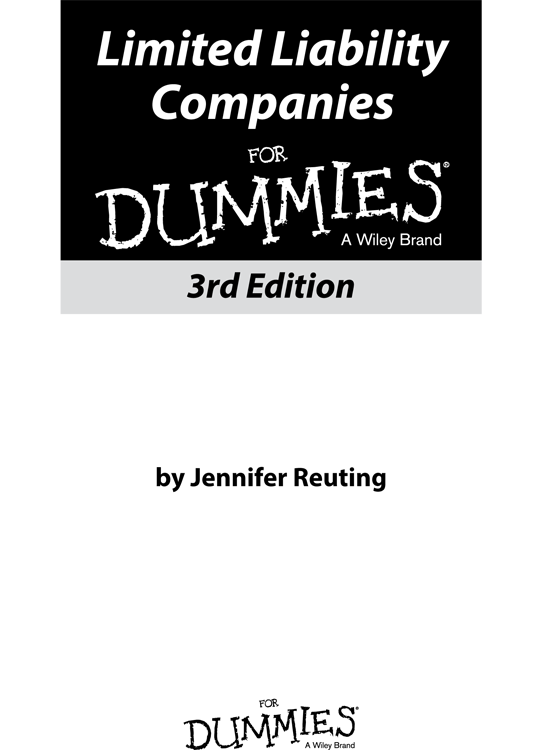
Limited Liability CompaniesFor Dummies, 3rd Edition
Published by: John Wiley & Sons, Inc., 111 River Street, Hoboken, NJ 07030-5774, www.wiley.com
Copyright 2014 by John Wiley & Sons, Inc., Hoboken, New Jersey
Published simultaneously in Canada
No part of this publication may be reproduced, stored in a retrieval system or transmitted in any form or by any means, electronic, mechanical, photocopying, recording, scanning or otherwise, except as permitted under Sections 107 or 108 of the 1976 United States Copyright Act, without the prior written permission of the Publisher. Requests to the Publisher for permission should be addressed to the Permissions Department, John Wiley & Sons, Inc., 111 River Street, Hoboken, NJ 07030, (201) 748-6011, fax (201) 748-6008, or online at http://www.wiley.com/go/permissions .
Trademarks: Wiley, For Dummies, the Dummies Man logo, Dummies.com, Making Everything Easier, and related trade dress are trademarks or registered trademarks of John Wiley & Sons, Inc., and may not be used without written permission. All other trademarks are the property of their respective owners. John Wiley & Sons, Inc., is not associated with any product or vendor mentioned in this book.
LIMIT OF LIABILITY/DISCLAIMER OF WARRANTY : WHILE THE PUBLISHER AND AUTHOR HAVE USED THEIR BEST EFFORTS IN PREPARING THIS BOOK, THEY MAKE NO REPRESENTATIONS OR WARRANTIES WITH RESPECT TO THE ACCURACY OR COMPLETENESS OF THE CONTENTS OF THIS BOOK AND SPECIFICALLY DISCLAIM ANY IMPLIED WARRANTIES OF MERCHANTABILITY OR FITNESS FOR A PARTICULAR PURPOSE. NO WARRANTY MAY BE CREATED OR EXTENDED BY SALES REPRESENTATIVES OR WRITTEN SALES MATERIALS. THE ADVICE AND STRATEGIES CONTAINED HEREIN MAY NOT BE SUITABLE FOR YOUR SITUATION. YOU SHOULD CONSULT WITH A PROFESSIONAL WHERE APPROPRIATE. NEITHER THE PUBLISHER NOR THE AUTHOR SHALL BE LIABLE FOR DAMAGES ARISING HEREFROM. FULFILLMENT OF EACH COUPON OFFER IS THE SOLE RESPONSIBILITY OF THE OFFEROR.
For general information on our other products and services, please contact our Customer Care Department within the U.S. at 877-762-2974, outside the U.S. at 317-572-3993, or fax 317-572-4002. For technical support, please visit www.wiley.com/techsupport .
Wiley publishes in a variety of print and electronic formats and by print-on-demand. Some material included with standard print versions of this book may not be included in e-books or in print-on-demand. If this book refers to media such as a CD or DVD that is not included in the version you purchased, you may download this material at http://booksupport.wiley.com . For more information about Wiley products, visit www.wiley.com .
Library of Congress Control Number: 2013956850
ISBN 978-1-118-85298-9 (pbk); ISBN 978-1-118-85653-6 (ebk); ISBN 978-1-118-85659-8 (ebk)
Manufactured in the United States of America
10 9 8 7 6 5 4 3 2 1
Chapter 1
What Is an LLC, Really?
In This Chapter
 Understanding LLC basics
Understanding LLC basics
 Creating your plan of attack
Creating your plan of attack
 Knowing the essentials for operating an LLC
Knowing the essentials for operating an LLC
The Limited Liability Company (more commonly known by its acronym, LLC) is by far the most popular business structure. Only a decade ago, the LLC was the new kid on the block untrusted and unverified. Luckily, that changed pretty rapidly LLCs gained popularity and, within a short time, became firmly established in the business world. Since then, LLC has become a household term, and for good reason.
The LLC is a complete divergence from its predecessor, the corporation. While corporations have a fixed management structure, LLCs offer flexibility. While corporations have strict rules regarding owners and profit distributions, LLCs are adjustable. While corporations are stuck with corporate taxation (or its limited variant, S corporation taxation), with an LLC you can select whichever form of taxation you prefer. The added flexibility of the LLC enables you to build a solid foundation for your business that works for your exact circumstances.
Great, right? Well yes and no. With all the hoopla and the incessant commercials from filing companies, we all know how easy it is to file an LLC. However, very few folks can really explain how an LLC works, or why an LLC is right for your situation, or, even worse, how to actually structure it after receiving that one-page filing back from the state. Aside from hiring a pricey attorney (not an option for most people), the majority of your peers dont know how to do simple things like issue the ownership properly or formally agree on what happens if one of the partners wants to leave.
The LLC is a powerful tool, but if you dont know how to use it how to build that crucial foundation that will support your greatest potential then it really amounts to nothing more than the piece of paper on which your formation document is printed and possibly a few lawsuits along the way.
I go into detail on setting up an LLC for your specific circumstances later in the book, but first I want to give you an overview or a refresher, if youre a seasoned pro on the meat and bones of this awesome business structure.
Understanding How LLCs Work
Think of an LLC as a partnership on steroids. If you and a buddy were to get together and start a business without registering it as any particular business structure with the state, your business would automatically be considered a general partnership. All business income and losses would be reflected on your personal tax returns. No rigid formalities would be required you could literally draft your agreements on a napkin.
The problem is, what happens if you want to raise capital? The business is comprised of only you and your partner, and possibly some assets that youve acquired along the way. You cant exactly sell pieces of yourself. Or what if your partner ends up being, well, a jerk? Or even worse, a jerk who runs up a lot of debts that you could be personally responsible for? Eek! As unfair as it sounds, thats the reality for partnerships. Until the LLC came along, that is.
The LLC takes all the best features of a partnership (pass-through taxation defined at the end of this chapter and no hefty burdens of corporate formalities) and the best features of a corporation (personal liability protection and ownership shares) and then adds a few extra perks for good measure, like the capability to choose your own form of taxation and a formal yet flexible management structure. In addition, the LLC can offer a second layer of liability protection that shields the business from any personal lawsuits that may befall you (referred to as charging order protection, which I elaborate on in Chapter ).
If all this sounds like Martian to you, dont worry. In this chapter, I dive into some of those benefits and other LLC fundamentals a bit more, all while steering you toward other chapters in the book where you can read about specific topics in more detail.
Owners: You gotta have em
Although LLCs are separate from their owners in a lot of ways, they still need to have them. An LLC without an owner is like a child without parents: It simply doesnt exist. So, even though you may have called up a filing company and filed your LLC with the state, until you go through the process of doling out ownership in your LLC, it doesnt become its own legitimate entity.
Next page
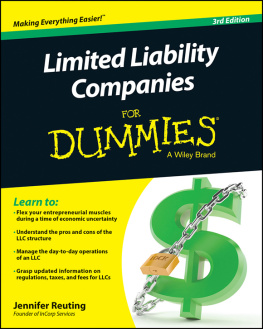

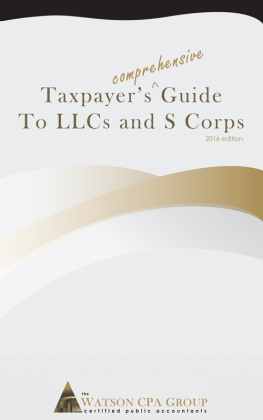
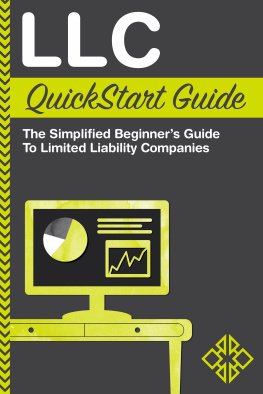
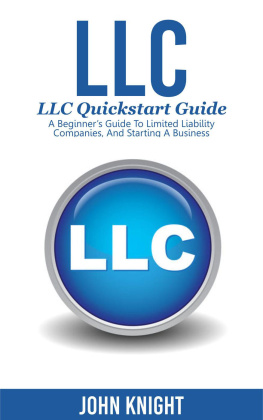

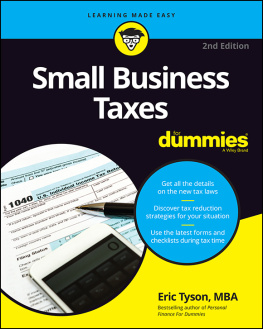
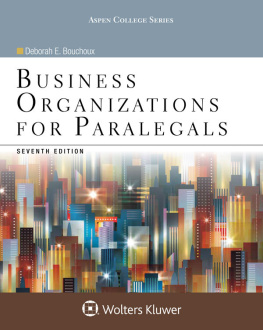
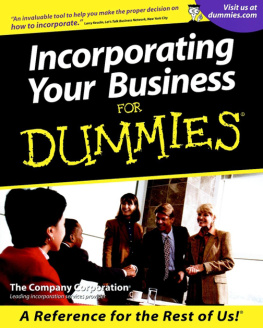

 Understanding LLC basics
Understanding LLC basics